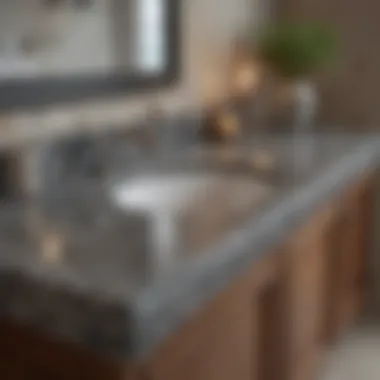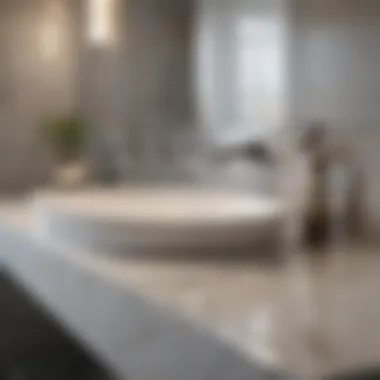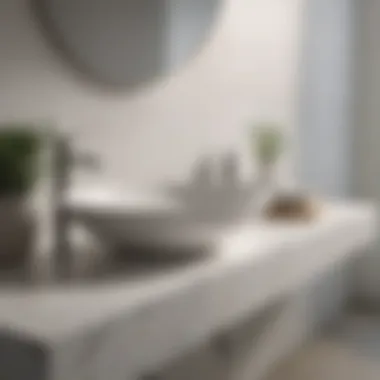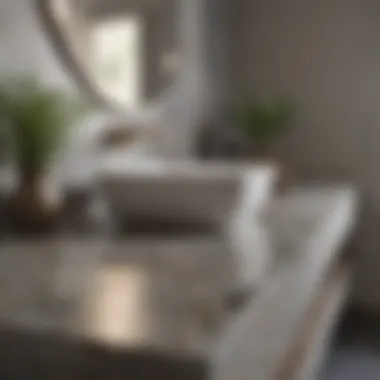Durable Bathroom Countertops: A Comprehensive Guide


Intro
Selecting the right bathroom countertop is a critical step in both functionality and aesthetics. The bathroom, often one of the most utilized spaces in a home, requires surfaces that can withstand daily wear and tear. Factors such as moisture, scratches from various toiletries, and the general rigors of a high-traffic environment necessitate materials that offer both durability and ease of maintenance.
In this article, we will delve into the intricacies of durable bathroom countertops, assessing various materials like granite, quartz, solid surface, and laminate. Each of these options presents unique advantages and potential drawbacks, making educated choices paramount for homeowners and designers alike.
Understanding durability, maintenance, and style preferences will aid in enhancing the living space effectively. By giving careful consideration to the material's characteristics, one can ensure that their choice not only meets practical needs but also complements the overall design theme of the bathroom.
Prolusion to Bathroom Countertops
Bathroom countertops play a crucial role in the design and functionality of any bathroom space. They not only provide a practical working surface for daily routines, but they also contribute significantly to the aesthetic appeal of the room. With myriad materials available, selecting the right countertop can seem overwhelming, yet it is essential for both form and function.
Overview of Bathroom Countertop Functionality
Countertops serve various functions in the bathroom, ranging from holding toiletries to providing a space for grooming. They need to be durable enough to withstand daily wear and tear while also complementing the overall design of the bathroom. Different materials offer varying degrees of functionality. For instance, a smooth surface is ideal for easy cleaning, while a more textured surface may provide character but could be less practical in terms of maintenance.
Importance of Durability in Bathroom Environments
Durability is a key consideration when choosing a bathroom countertop. The bathroom environment is often characterized by high humidity and frequent temperature fluctuations. This means the materials used must resist moisture and heat effectively. A durable countertop can tolerate spills, scratches, and stains that inevitably occur during everyday use. Homeowners should prioritize materials that can endure these challenges, ultimately reducing the need for frequent replacements or repairs.
"Choosing the right material is not just about aesthetics. It's about investing in something that will last, saving time and money in the long run."
To conclude, understanding the importance of bathroom countertops is the first step in making an informed choice. When contemplating aesthetics and functionality, one must also weigh the aspects of durability carefully.
Key Factors Defining Durability
Durability in bathroom countertops is not merely a matter of aesthetics; it encompasses various essential factors that influence longevity and performance. Understanding these key factors can greatly inform decisions, ensuring that the chosen countertops withstand the unique challenges presented by bathroom environments. This section explores the specific elements that define durability, particularly focusing on moisture resistance, scratch and chip resistance, heat resistance, and stain resistance. Each aspect holds significant weight when assessing different materials, as they directly impact maintenance and overall satisfaction after installation.
Moisture Resistance
Moisture resistance is arguably the primary consideration for bathroom countertops. Given the high humidity levels typical of bathrooms, countertops must withstand constant exposure to water. Materials like granite and quartz exhibit superior moisture resistance due to their non-porous properties, which prevent water absorption. This is crucial as water can lead to warping, mold growth, and deteriorating surfaces over time.
Choosing a countertop with high moisture resistance not only prolongs its life but also ensures a healthier environment. Homeowners must remember that surfaces like laminate might not offer the same level of protection, making them less suitable for humid conditions. Ultimately, the right choice here can safeguard against potential costly repairs and replacements in the future.
Scratch and Chip Resistance
In high-traffic areas like bathrooms, scratch and chip resistance is critical. Frequent use of counters for placing items can lead to scratches which affect both the appearance and functionality. Solid surface countertops, for instance, provide an excellent balance between durability and aesthetic appeal, as they are resistant to scratches and can be refinished if minor damage occurs.
Granite counters, while durable, can chip if mishandled, particularly at the edges. In contrast, quartz surfaces stand out with their engineered composition that enhances both scratch and chip resistance. Homeowners should consider their usage patterns when selecting materials, bearing in mind that extra care may be necessary for more vulnerable options.
Heat Resistance
Heat resistance is another essential feature for bathroom countertops. While bathroom surfaces do not typically encounter extreme heat, they are still exposed to heat from styling tools and other appliances. Countertops like granite can endure high temperatures without damage, making them suitable for users who frequently utilize heat-generating devices.
On the other hand, materials like laminate might not fare well under intense heat, as they can warp or discolor. It's essential to think about potential heat exposure when selecting countertops. Selecting heat-resistant options can enhance safety and prevent costly repairs over time.
Stain Resistance


Lastly, stain resistance is vital for maintaining the beauty of bathroom countertops. The bathroom often comes into contact with products like makeup, hair dye, and cleaning agents that can cause unsightly stains if not promptly cleaned. Quartz countertops excel in this category, possessing a low porosity that makes cleaning easier and prevents staining.
On the contrary, natural stones like granite need to be sealed periodically to maintain their stain resistance. This aspect requires ongoing attention from homeowners. When considering countertops, prioritizing materials with high stain resistance can save time and effort in routine cleaning and maintenance, safeguarding against permanent discoloration.
Choosing the right countertop based on durability factors ultimately enhances the usefulness and aesthetics of the bathroom space.
Understanding these key factors is essential for making an informed decision. Every choice impacts the functionality and appearance of the bathroom, thus it greatly affects homeowner satisfaction. By analyzing these durability aspects, homeowners can navigate their options effectively.
Comparative Analysis of Countertop Materials
When choosing a bathroom countertop, understanding the various materials available is crucial. Each material offers unique characteristics that impact appearance, durability, maintenance, and cost. An effective comparative analysis not only illuminates the differences between the options but also helps homeowners and designers align choices with their specific needs. This section explores popular bathroom countertop materials, scrutinizing the advantages and disadvantages associated with each one. Through this analysis, the goal is to empower informed decisions that blend functionality and aesthetics.
Granite: Pros and Cons
Granite is often lauded for its natural beauty and robustness. It is a natural stone formed from crystallized minerals, giving it unique patterns and colors.
Pros:
- Durability: Granite is highly resistant to scratching, making it suitable for high-traffic bathrooms.
- Heat Resistance: It can withstand hot items without damage.
- Variety: Available in many hues and styles, granite is versatile for different designs.
Cons:
- Sealing Required: It requires periodic sealing to maintain its stain resistance.
- Weight: The heaviness can complicate installation.
- Cost: It is generally more expensive than some other options.
Quartz: The Engineered Choice
Quartz countertops, while derived from natural minerals, are engineered stone products. This combination provides distinct advantages.
Pros:
- Non-Porous: Quartz is non-porous, meaning it doesn’t require sealing and is highly resistant to stains.
- Uniform Appearance: The engineered nature allows for consistent colors and patterns.
- Durability: Resistant to scratches and chips, quartz offers long-lasting performance.
Cons:
- Heat Sensitivity: It can be sensitive to extreme heat compared to natural stones like granite.
- Cost Variability: Depending on the brand and design, costs can vary widely.
Solid Surface Countertops
Solid surface materials are man-made, often composed of acrylic or polyester resins. They provide an attractive, seamless look for bathrooms.
Pros:
- Seamless Appearance: Can be fabricated to create a continuous surface without visible seams.
- Easy to Repair: Minor scratches can be sanded away, making maintenance straightforward.
- Variety of Designs: Available in a range of colors and patterns, it mimics natural stone.
Cons:
- Not Heat Resistant: Susceptible to damage from hot items.
- Less Durable: Not as scratch-resistant as quartz or granite, though some modern versions improve this.


Laminate: A Budget-Friendly Option
Laminate countertops consist of layers of material bonded together, with a decorative surface. They are an economical choice for bathrooms.
Pros:
- Affordability: Laminate is one of the most budget-friendly options available.
- Wide Variety: Comes in numerous colors and patterns, including wood and stone looks.
- Lightweight: Easier to handle and install compared to heavier materials like granite.
Cons:
- Durability Issues: Prone to scratches and damage, requiring more care.
- Water Exposure: Seams can absorb moisture, leading to swelling or damage over time.
Concrete Countertops: The Modern Appeal
Concrete countertops have gained popularity due to their unique industrial aesthetic and customizable nature.
Pros:
- Customizable Design: Allows for various finishes, colors, and shapes, appealing to modern sensibilities.
- Durability: Very tough and resistant to heavy impacts.
- Integrated Sinks: Can be molded to incorporate sinks directly into the surface.
Cons:
- Sealing Needed: Requires sealing to prevent staining and moisture absorption.
- Weight: Similar to granite, its dense nature may complicate installation and support needs.
Care and Maintenance of Bathroom Countertops
Maintaining bathroom countertops is essential for extending their lifespan and preserving their aesthetic appeal. Proper care routines not only enhance the durability of various countertop materials but also keep them looking fresh and new for a longer period. Given the humid and potentially harsh environment of a bathroom, understanding the specific cleaning and preventive measures for each countertop material is crucial. Inefficient maintenance can lead to irreversible damage, such as stains, scratches, and moisture penetration, which can compromise both functionality and hygiene.
Cleaning Recommendations
Regular cleaning is fundamental to countering the effects of moisture and grime build-up in the bathroom. Here are some good practices for keeping your countertops in pristine condition:
- Use Mild Cleaners: Choose cleaners that are appropriate for the material. For instance, granite should be cleaned with a pH-neutral soap, while quartz can often tolerate a wider range of compounds. Avoid harsh chemicals that can dull the surface.
- Soft Cloths: Using soft, non-abrasive cloths for wiping is essential. Scrubbing with rough pads can cause scratches, leading to a rougher texture over time.
- Direct Cleaning: Immediately wipe spills to prevent staining. This is crucial for porous materials like granite and concrete, which can absorb liquids.
- Avoid Excess Water: When cleaning, do not leave excess water standing on the surface. This can foster mold growth and may damage materials susceptible to moisture.
"Regular cleaning can significantly prolong the life of your bathroom surfaces, making them less prone to damage."
Preventive Measures
Implementing preventive measures is just as vital as regular cleaning. Here are recommendations to shield your countertops from damage:
- Sealing: Seal granite and natural stones regularly to maintain moisture resistance. This not only blocks stains but also facilitates easier cleaning.
- Coasters and Mats: Always use coasters under drinks and mats for heavy items. This reduces the risk of scratches and moisture from condensation.
- Avoid Hot Items: Do not place hot items directly on the countertop. Wood or ceramic trivets can act as barriers against heat damage.
- Test New Products: Always test new cleaning products on a small, inconspicuous area first. This helps avoid any adverse reactions that may damage the surface.
Trends in Bathroom Countertops
Understanding current trends in bathroom countertops is critical for homeowners and anyone involved in interior design. Trends can inform choices and reflect individual style while also enhancing the functionality of the space. Particularly in bathroom renovations, the trends highlight a shift toward sustainable practices and innovative design elements that satisfy both utility and aesthetics.
Sustainable Materials


Sustainable materials have become a significant trend in bathroom countertops. This movement is driven by increased environmental awareness among consumers. Homeowners are now prioritizing eco-friendly options that reduce harm to the planet.
Materials like recycled glass, bamboo, and certain types of quartz offer durability and style. These surfaces are not only resilient but also help in reducing the carbon footprint of households. Using sustainable materials often means selecting options that have been certified by viable environmental standards.
Additionally, many of these materials often require less maintenance, which contributes to their long-term sustainability. Homeowners need to consider:
- Recycled Glass: This creates unique designs while contributing to waste reduction.
- Bamboo: Strong and renewable, bamboo provides a hard surface that is environmentally friendly.
- Bamboo: Strong and renewable, bamboo provides a hard surface that is environmentally friendly.
Choosing sustainable materials can also positively impact overall home value, appealing to potential buyers who appreciate responsible choices.
Color and Finish Innovations
Color and finish innovations are shaping contemporary bathroom designs. The market offers a wide spectrum of colors, allowing for personalization and unique styling in space. Recent trends show a preference for bold colors, such as deep blues and rich greens. These shades can bring warmth and character, contrasting with traditional lighter tones.
Furthermore, finishes have evolved significantly. High-gloss finishes can create an illusion of a larger space, while matte surfaces offer a sophisticated look that’s less prone to show fingerprints or smudges. Trends to watch include:
- Matte Finishes: Gaining popularity for a modern, understated appearance.
- Textured Surfaces: These add visual interest and can enhance grip, particularly in wet environments.
- Mixed Materials: Combining different materials and colors to create striking contrasts. This trend facilitates unique designs with personal touches.
Ultimately, these innovations provide options that not only fulfill aesthetic desires but also meld seamlessly with practical requirements. Selecting the appropriate color and finish can elevate the bathroom from a mere functional area to a sophisticated sanctuary.
Cost Considerations
Understanding the costs associated with bathroom countertops is crucial for making an informed choice. The budget influences not just the purchase of materials but also the long-term satisfaction with the final product. By analyzing both material costs and installation expenses, homeowners can better assess their financial commitment and find a countertop that aligns with their financial plans. Sustainable decisions often consider cost as a determinant of value.
Material Costs
The price of materials varies greatly among different types of countertops. Natural stone, like granite, tends to be on the higher end of the spectrum. For instance, granite prices can range from $40 to $200 per square foot, influenced by the stone's quality and availability. On the other side, quartz, which is engineered, usually falls within $50 to $150 per square foot. Solid surface materials also offer a mid-range alternative with prices typically between $35 to $85 per square foot.
Laminate countertops present the most budget-friendly option, often ranging from $10 to $50 per square foot. This option allows for aesthetic variety at a lower cost, making it appealing for cost-conscious homeowners. However, it may lack some durability when compared to other materials. Beyond the intrinsic cost of materials, one must also contemplate the prospective longevity and maintenance expenses, which could influence overall value over time.
Installation Expenses
Installation implications also significantly affect the overall costs. The complexity inherent in the installation process varies by material type. For example, granite requires special equipment and skilled labor, typically resulting in installation charges that range from $30 to $100 per square foot.
Quartz, while still needing expert installers, may present slightly lower installation costs, averaging $25 to $70 per square foot. Solid surface countertops are more DIY-friendly. This could reduce installation fees if homeowners opt for a do-it-yourself approach, although professional installation is recommended for the best results. Laminate installation costs are usually the lowest, ranging from $15 to $40 per square foot, making it an especially appealing choice for budget-oriented projects.
Finale
The topic of durable bathroom countertops is significant due to the multifaceted role these surfaces play in both functionality and aesthetics within a bathroom setting. In an environment characterized by high moisture and frequent use, the right countertop material can not only enhance the visual appeal but also ensure longevity and ease of maintenance. Homeowners must recognize the inherent properties of various materials and how each relates to their specific needs.
Choosing durable countertops means understanding essential factors such as moisture resistance, scratch resistance, and stain resistance. Each material from granite to quartz offers unique advantages and varying levels of performance. For instance, granite is well-known for its natural strength and beauty, while quartz offers a non-porous surface that is easy to maintain. Evaluating these aspects carefully allows for an informed decision that balances style with practicality.
Moreover, the importance of considering cost cannot be overstated. Different countertop materials come with different price points, and budgeting appropriately is essential for avoiding future financial strain. The investment in a higher-quality material may yield better long-term results, reducing the need for replacements or repairs.
In summary, the conclusion drawn from exploring durable bathroom countertops is clear: a thorough understanding of the materials ensures that homeowners make decisions that not only meet their aesthetic goals but also their functional requirements. By adhering to the aspects discussed throughout this article, one can successfully navigate the selection process and ultimately enjoy a bathroom that is both beautiful and resilient.
Final Thoughts on Selecting Durable Countertops
When selecting durable countertops, it is vital to consider individual preferences and lifestyles. A family with children may prioritize scratch and stain resistance over other features, while a couple may value aesthetics more. Thoughtful assessment of these factors will lead to a more personalized and satisfying selection.
Keep in mind the following points:
- Research the material's characteristics: Take time to understand various options such as quartz, granite, and laminate. Each has its strengths and weaknesses.
- Consider the specific bathroom usage: Heavy use environments may dictate the need for more robust materials.
- Estimate total costs: Factor in both the material and installation costs to avoid budget issues later.
Ultimately, this decision can dramatically affect the bathroom experience, adding both value and comfort. By aligning choices with practical considerations and personal taste, one can ensure that the chosen countertops stand the test of time.



